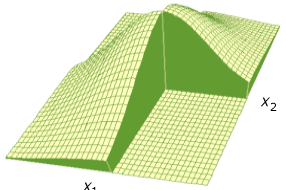| Date |
Topics |
Readings |
Due |
Notes |
| 26 Jan |
Introduction to AI
|
opt: RN 1.1,2 |
- |
 |
| Agents |
| 31 Jan |
Agents
Depth and breadth first search
|
3.1,3.3,3.4
opt: RN 3.2 |
HW00 |
 |
| 2 Feb |
Agents II
A* Search and Heuristics
|
3.5-3.6 |
HW01 |
 |
| 7 Feb |
Constraint Satisfaction
Search and iterative algorithms
|
RN 6-6.3
opt: RN 4.1 |
P0 |
 |
| 9 Feb |
Constraint Satisfaction II
Tree-structured CSPs and more search
|
RN 6.4-6.5
opt: Tree_decomposition |
HW02 |
- |
| 14 Feb |
Game Playing
Minimax search
|
RN 5-5.3
opt: RN 5.5-5.6
slides |
- |
 |
| 16 Feb |
Utility
Consistency and risk
|
16-16.3
opt: RN 16.4 |
HW03 |
 |
| Reinforcement Learning |
| 21 Feb |
Markov Decision Processes
Value iteration
|
SB 3-4 |
P1 |
 |
| 23 Feb |
Markov Decision Processes II
Policy iteration and TD-learning
|
RN 17.1-3, SB 6.1,6.2 |
HW03.5 |
 |
| 28 Feb |
Reinforcement Learning
Exporation/exploitation, Q-learning
|
SB 6.5 |
- |
 |
| 1 Mar |
Catch-up
|
SB 8.1,8.2 |
HW04 |
- |
| 6 Mar |
Reinforcement Learning II
Policy methods and IRL
|
- |
P2 |
- |
| 8 Mar |
IRL II
|
- |
HW05 |
 |
| 13 Mar |
POMDPs
Agents under uncertainty
|
Dummies, Sec 3-6 |
- |
 |
| 15 Mar |
Midterm review
(past: 2009, 2010)
|
- |
HW06 |
- |
| Reasoning Under Uncertainty |
| 27 Mar |
Probability
Everything you need to know!
|
RN 13-13.5
opt: RN 13.6 |
- |
 |
| 29 Mar |
MIDTERM (Midterm and solution)
|
- |
- |
- |
| 3 Apr |
Bayes' Nets
Graphical models and conditional independence
|
RN 14-14.3
opt: RN 14.4 |
- |
 |
| 5 Apr |
Bayes' Nets II
Causality
|
- |
HW07, P3 (early) |
 |
| 10 Apr |
Bayes' Nets III
Inference by enumeration, variable elimination
|
RN 14.4 |
P3 |
 |
| 12 Apr |
Bayes' Nets IV
Markov Chain Sampling
|
RN 14.5 |
HW08 |
 |
| 17 Apr |
Decision Diagrams
Value of information, Markov chains
|
RN 16.5-16.6 |
- |
 |
| 19 Apr |
HMMs
Monitoring and robot localization
|
RN 15-15.3 |
HW09 |
 |
| 24 Apr |
HMMs II
Particle filtering and resampling
|
RN 15.5 |
- |
- |
| Applications |
| 26 Apr |
Language stuff I
Speech and machine translation
|
RN 23.4-23.5 |
HW10 |
 |
| 1 May |
Language stuff II
Topic modeling
|
- |
- |
- |
| 3 May |
Computer vision
|
- |
HW11 |
- |
| 8 May |
Machine learning
Classification
|
RN 24.3-24.4
opt: RN 24-24.2 |
contest |
 |
| 10 May |
Last Day Party
Philosophy of AI and exam discussion
|
- |
HW12 |
- |
| 18 May |
FINAL EXAM, 10:30 am - 12:30 pm (solution)
(past: 2009, 2010 and solution)
|
- |
- |
- |
| 21 May |
End of exam period
|
- |
P4 |
- |



 Overall grades will be determined from:
Overall grades will be determined from:
 The official textbook for this course is:
Artificial Intelligence: A Modern
Approach (Third Edition)
The official textbook for this course is:
Artificial Intelligence: A Modern
Approach (Third Edition)
 See the syllabus above for due dates.
You're free to use the LaTeX source in any way you want, but you'll
need haldefs.sty
and notes.sty to build them.
If you want more practice, see the recommended
book exercises.
See the syllabus above for due dates.
You're free to use the LaTeX source in any way you want, but you'll
need haldefs.sty
and notes.sty to build them.
If you want more practice, see the recommended
book exercises.
 The semester will culminate with a capture-the-flag style Pacman
competition. In this competition, each team will control two Pacman
characters that will attempt to recover a flag in the other team's
territory without getting eaten! Special prizes for the winner!
The competition will be centered around the Pacman code that we
develop in the programming projects. See here.
The semester will culminate with a capture-the-flag style Pacman
competition. In this competition, each team will control two Pacman
characters that will attempt to recover a flag in the other team's
territory without getting eaten! Special prizes for the winner!
The competition will be centered around the Pacman code that we
develop in the programming projects. See here.